Frank Bramley | |
|---|---|
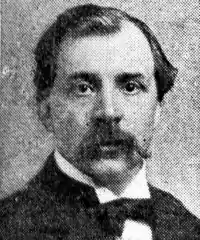 Self portrait (1897) | |
| Born | 6 May 1857 Sibsey, Lincolnshire, England |
| Died | 9 August 1915 (aged 58) Chalford Hill, Gloucestershire, England |
| Nationality | English |
| Education | Lincoln School of Art, Royal Academy of Fine Arts (Antwerp) |
| Known for | Painter |
| Movement | Newlyn School, Post-Impressionism |
| Spouse | Katherine Graham Bramley |


Frank Bramley RA (6 May 1857 – 9 August 1915)[nb 1] was an English post-impressionist genre painter of the Newlyn School.
Personal life
Bramley was born in Sibsey, near Boston, in Lincolnshire to Charles Bramley from Fiskerton also in Lincolnshire.[1]
From 1873 to 1878 Bramley studied at the Lincoln School of Art. He then studied from 1879 to 1882 at the Royal Academy of Fine Arts in Antwerp, where Charles Verlat was his instructor. He lived in Venice from 1882 to 1884 and then moved to Newlyn, Cornwall.[2][3]
Bramley married fellow artist Katherine Graham, daughter of John Graham from Huntingstile, Grasmere, Westmoreland, in 1891.[1][nb 2] The couple lived at Orchard Cottage, which at the time was called Belle Vue Cottage, from 1893 to 1897.[5] In 1895 they moved to Droitwich in the West Midlands.[6] They lived at Bellue Vue House in 1889[5] and by 1900 had settled at Grasmere in the Lake District.[2][6]
Bramley died in Chalford Hill, Gloucestershire in August 1915.[3]
Career
Having returned to England from Venice in or after 1884, Bramley established himself in the Newlyn School artist colony on Rue des Beaux Arts in Newlyn.[2][5] Along with Walter Langley and Stanhope Forbes, he was considered to be one of the "leading figures" of the Newlyn School.[5]
In contrast to other members of the Newlyn school, Bramley specialised in interiors[2] and worked on combining natural and artificial light in his paintings, such as A Hopeless Dawn.[7][8]
During his time in Newlyn, Bramley was a particular exponent of the ‘square brush technique’, using the flat of a square brush to lay the paint on the canvas in a jigsaw pattern of brush strokes, giving a particular vibrancy to the paint surface. In the early 1890s, his palette became brighter and his handling of the paint looser and more impastoed, while his subject matter narrowed to portraits and rural genre paintings.[2]
An example of Bramley's use of the square brush technique is his painting Domino![5]
His A Hopeless Dawn (1888) is held by the Tate Gallery, London after having been purchased for the nation by the Chantrey Bequest and is one of Bramley's most favored works. Praised by the Royal Academy, Penlee House also appreciate this Bramley work: "The painting’s strong emotional and narrative content, together with its aesthetic appeal and tonal harmony, make this one of the most admired Newlyn School works to this day." The young grieving woman in the painting, artist model Effy Reynolds James. The painting was referenced in an April 2010 General Conference address by President of the Church of Jesus Christ of Latter-day Saints, Thomas S. Monson.
Bramley was one of the founders of the New English Art Club, but left the organization after having received condemning comments from Walter Sickert.[5]
In 1894 Bramley became an Associate of the Royal Academy (ARA) and in 1911 he became a Royal Academician (RA). He was also a gold medal winner at the Paris Salon.[2][3]
Exhibitions
Works
Selected paintings include:
- A Venetian Market Girl, 1883.[9]
- Primrose Day, 1885.[10]
- Everyone His Own Tale, 1885.[11]
- Domino, 1886.[1]
- Eyes and No Eyes, 1887.[1]
- A Hopeless Dawn, 1888.[12]
- Saved, 1889.[1]
- For of Such is the Kingdom of Heaven, 1891.[13]
- Old Memories, 1892.[1]
- After Fifty Years, 1893.[1]
- Sleep, A Portrait of Mrs. Bolitho, 1895.[1]
- After the Storm, 1896.[1]
- Friends, 1907.[14]
Gallery
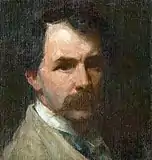 Self portrait, 1897, oil on canvas
Self portrait, 1897, oil on canvas Sir Frederick Augustus Abel, 1st Baronet, National Portrait Gallery, London
Sir Frederick Augustus Abel, 1st Baronet, National Portrait Gallery, London Everyone Has His Own Tale, 1885, oil on canvas
Everyone Has His Own Tale, 1885, oil on canvas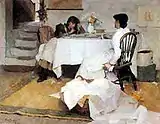 Domino!, 1886, oil on canvas
Domino!, 1886, oil on canvas Eyes and No Eyes, 1887, etching
Eyes and No Eyes, 1887, etching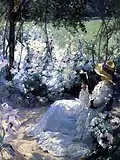 Delicious Solitude, 1909, oil on canvas
Delicious Solitude, 1909, oil on canvas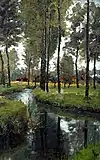 Borgerhout Anvers, oil on canvas
Borgerhout Anvers, oil on canvas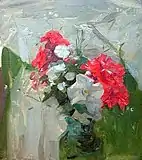 Flower Study, oil on canvas
Flower Study, oil on canvas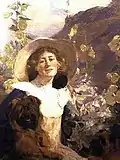 Friends - The Artist's Wife Katherine And Her Dog, oil on canvas
Friends - The Artist's Wife Katherine And Her Dog, oil on canvas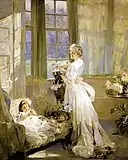 Helen Chalmers, 1908
Helen Chalmers, 1908
Notes
- ↑ Encyclopædia Britannica and Penlee House give the date of death as 10 August 1915.
- ↑ Catherine St. Clair Graham was born in 1868 in Dursley in Gloucestershire. In 1908 she exhibited 'Launching the Lifeboat' at the Royal Academy. Catherine also exhibited at the 1913 London Salon. She died on 20 January 1954 in Bournemouth.[4]
References
- 1 2 3 4 5 6 7 8 9 Victor Plarr. Men and women of the time: a dictionary of contemporaries. G. Routledge; 1899. p. 124.
- 1 2 3 4 5 6 7 8 Frank Bramley. Archived 29 April 2012 at the Wayback Machine Penlee House. Retrieved 6 October 2012.
- 1 2 3
 One or more of the preceding sentences incorporates text from a publication now in the public domain: Chisholm, Hugh, ed. (1922). "Bramley, Frank". Encyclopædia Britannica (12th ed.). London & New York: The Encyclopædia Britannica Company.
One or more of the preceding sentences incorporates text from a publication now in the public domain: Chisholm, Hugh, ed. (1922). "Bramley, Frank". Encyclopædia Britannica (12th ed.). London & New York: The Encyclopædia Britannica Company. - ↑ Caroline Graham. Penlee House. Retrieved 7 October 2012.
- 1 2 3 4 5 6 Frank Bramley. Cornwall Artists. 6 October 2012.
- 1 2 Caroline Fox; Francis Greenacre; Newlyn Orion Galleries. Artists of the Newlyn School, 1880-1900. Newlyn Orion Galleries; 1979. p. 166.
- ↑ Robert Andrews. The Rough Guide to Devon & Cornwall. Penguin; 1 April 2010. ISBN 978-1-4053-8606-7. p. 763.
- ↑ H.J. Dyos. Victorian City. Taylor & Francis US; 6 January 1999. ISBN 978-0-415-19324-5. p. 468.
- ↑ A Venetian Market Girl. Bridgeman Art on Demand.
- ↑ Primrose Day. Tate.
- ↑ Everyone His Own Tale. Sothebys.
- ↑ A Hopeless Dawn. Tate.
- ↑ For Such is the Kingdom of Heaven. New Zealand Museums.
- ↑ Friends. Christies.
Further reading
- Caroline Fox; Francis Greenacre; Barbican Art Gallery. Painting in Newlyn, 1880-1930. Barbican Art Gallery; 1985.
External links
- 18 artworks by or after Frank Bramley at the Art UK site
- Frank Bramley online (ArtCyclopedia)
- Frank Bramley - short biography (Artfact)